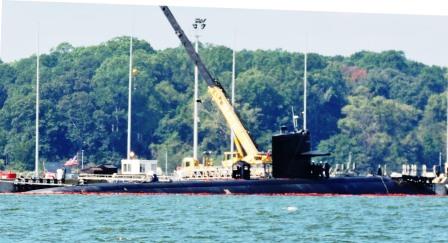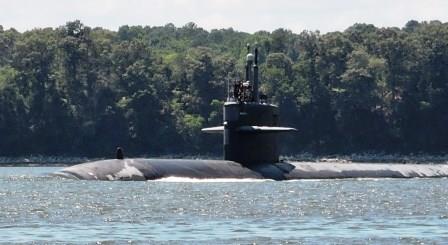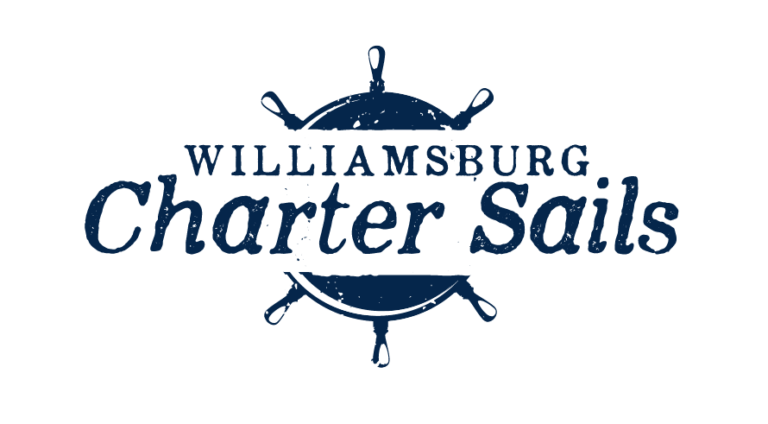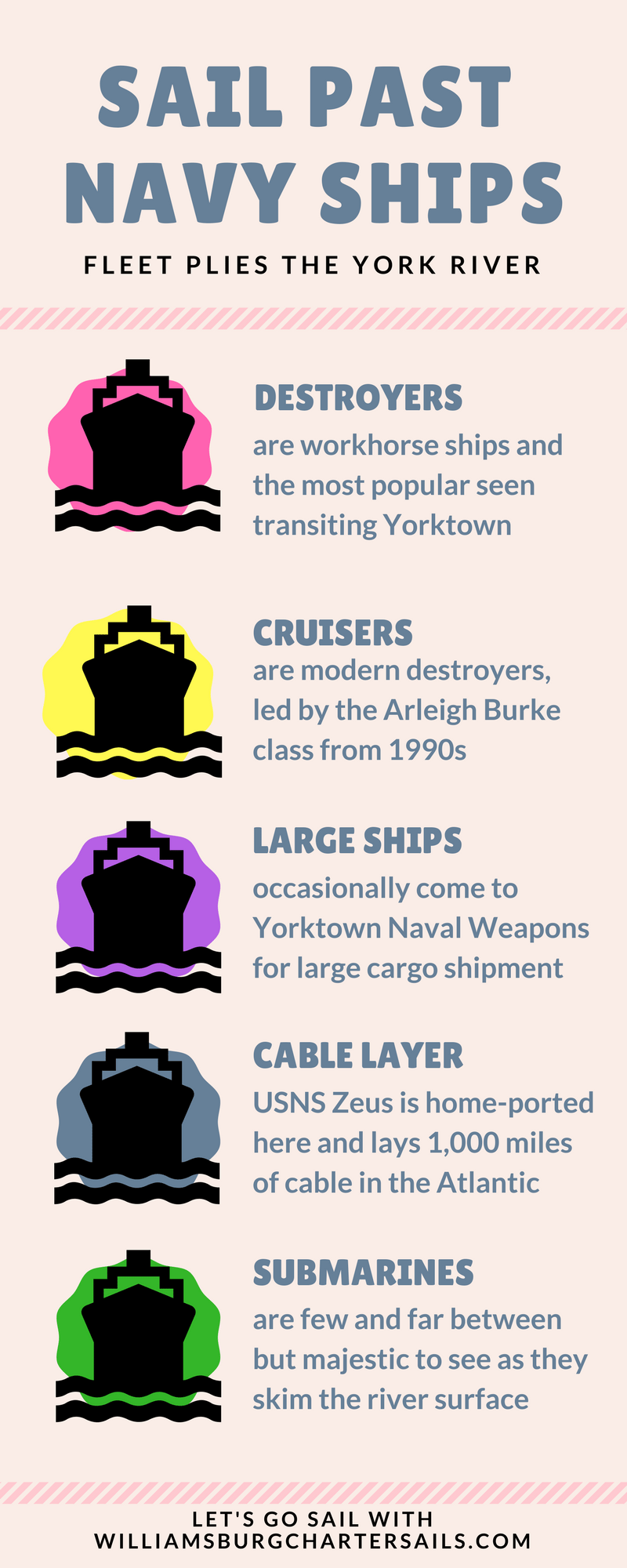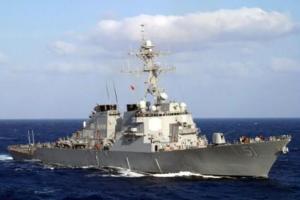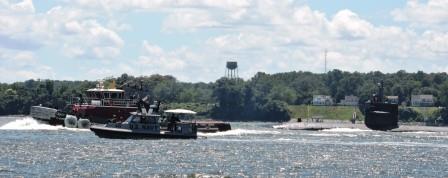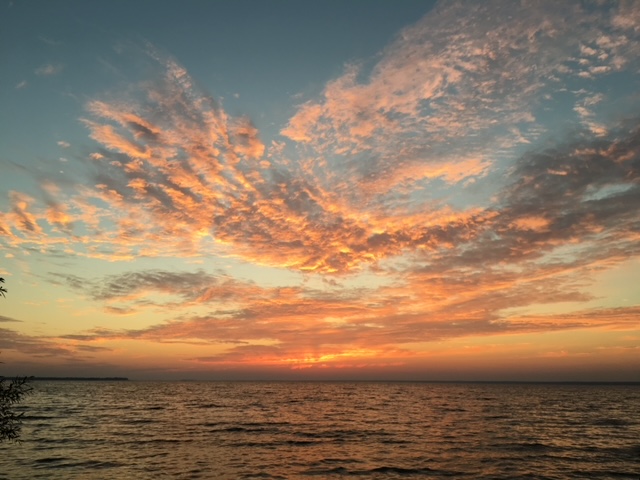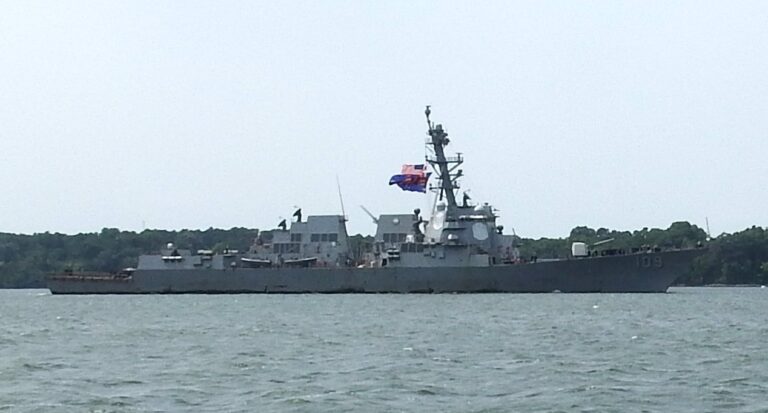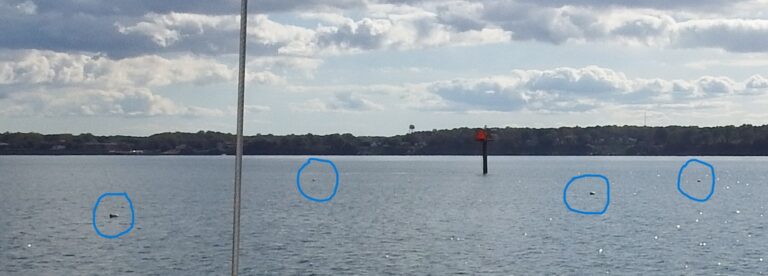Nearly every week, except during the holidays, US Navy ships ply the York River to and from Yorktown Naval Weapons Station. They arrive usually on Monday around noon and depart Thursday or Friday morning.
These ships are magnificent to see coming over the eastern horizon from Norfolk Naval Base. I manage to sail out toward the entrance to the river to narrate a short take on the 1781 Battle of the Capes. My crescendo is that the French deployed four man-of-war ships across the entrance to blockade Lord Cornwallis from escaping.
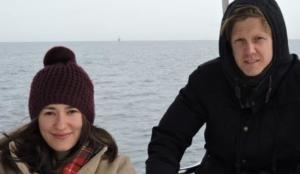
“The 18th century warships out there were big, as big as that one,” I’ll point. People are astonished, as if I ordered the modern ship on cue. As it reaches the river entrance, the Navy ship begins a port turn into the river channel and then heads toward the US Coast Guard Training Center on the south shore of Yorktown. Then the ship centers up to steer for the center of the Coleman Bridge, which will open shortly.
Navy destroyers
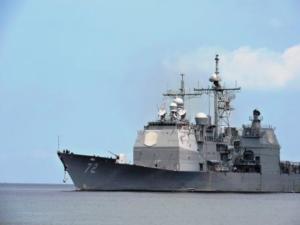 The most typical ship in the York is the Navy destroyer, in this case the USS Laboon. Destroyers come and go frequently to refresh their weapons before redeployment in the Middle East. Presumably they were firing into Syria or at other targets of ISIS troops.
The most typical ship in the York is the Navy destroyer, in this case the USS Laboon. Destroyers come and go frequently to refresh their weapons before redeployment in the Middle East. Presumably they were firing into Syria or at other targets of ISIS troops.
As the ship neared the bridge, a motorboat got too close and seemed to be approaching. A giant Moran tug behind the Laboon scared him off with big turbulence from his wake.
Navy cruisers
USS Arleigh Burke is the lead ship in the class of cruisers that bears its name. Built 1988, the Arleigh Burke class replaced the Ticonderoga class, which was getting to expensive to construct and maintain. The new class has stealth technology to improve its ability to evade missiles fired from other ships.
Perhaps the most famous member of the class was the USS Yorktown, whose launch was made by local officials. Inexplicably, the Yorktown has since been scuttled because of hull issues. US Navy cruisers and destroyers bear many similarities and are hard to differentiate visually.
Large ships
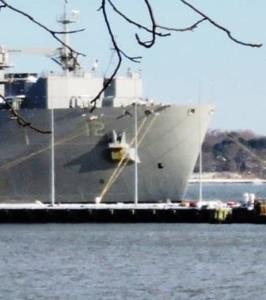 USNS William McLean is a large dry cargo and ammunition ship named for the physicist who developed the heat-seeking Sidewinder missile. It’s nearly 700 feet long and takes up an entire third of the formidably long NWS pier. The McLean can handle nearly 1.4 million cubic feet of cargo, which explains why it spent more than two weeks at the dock. The ship can also store two helicopters.
USNS William McLean is a large dry cargo and ammunition ship named for the physicist who developed the heat-seeking Sidewinder missile. It’s nearly 700 feet long and takes up an entire third of the formidably long NWS pier. The McLean can handle nearly 1.4 million cubic feet of cargo, which explains why it spent more than two weeks at the dock. The ship can also store two helicopters.
Cable-laying Zeus
Coming from the other direction, we see off in the distance the USNS Zeus proceeding slowly downriver from its home port of Cheatham Annex. The Zeus lays 1,000 miles of electronic cable up to 9,000 feet below. Its giant cable sheaves are visible only from bow and aft. Otherwise it looks like a grim cruise ship, painted white but with rust stains streaking the hull. It plies the Atlantic Ocean for six months at a time, criss-crossing cable on the ocean floor to detect Russian submarines.
Navy submarine
Perhaps the most dramatic arrival is that of a submarine. They ride two-thirds submerged, with just the top of the hull and the conning tower, or “sail,” visible. The subs are nearly invisible except for their entourage. I’ve been chased out of the channel by Navy Patrol boat announcing the arrival of a sub, complete with USCG cutter. Here we see a patrol boat and a Moran tug, with the sub off to the right. Subs are also difficult to see dockside because their profile is so narrow (below).
One reason for the security: While we can wonder which of the Navy ships are nuclear-powered, there is no ambiguity about subs. They all are. As for identifying them, good luck. No numbers are visible.
Navy captain
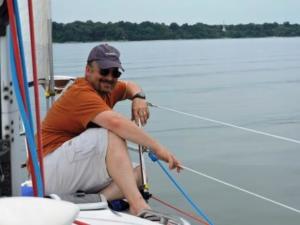 Retired Capt. Terry Culton commanded many a Navy destroyer and cruiser on the nearly two-hour trip from the Norfolk Fleet.
Retired Capt. Terry Culton commanded many a Navy destroyer and cruiser on the nearly two-hour trip from the Norfolk Fleet.
“The crew asked why it took so long to get here, but they didn’t realize you have to dogleg to get up here in order to avoid the shoals. We would approach the bridge at 10 or 12 mph and slow to 8 mph at the bridge.”
Do you need the tugboats? “Yes, because the current in the river can run 3 or 4 knots. Even though the USS Arleigh Burke has 100,000 horsepower and twin screws, it’s still difficult to steer backward.”
Let’s Go Sail with the Navy
Check rates and pick a day for a sailboat charter. See reviews on Trip Advisor.
